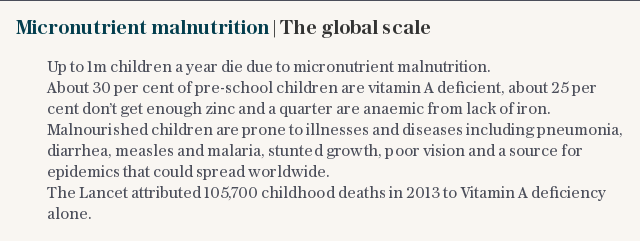We cannot end global hunger without investing to solve the problems of tomorrow

It is a heart-breaking reality that today – on World Food Day – 66 million children will go to school hungry, 23 million of them in Africa.
With the global population set to rise to 9.5 billion by 2050, the challenge to feed everyone will become greater. On top of this, climate change, and the risk of drought, flooding and erratic rainfall that comes with it, presents an increasing threat to our ability to grow enough food for everyone.
In Africa, where population growth is higher and temperatures are expected to rise much faster than on any other continent, the problem is most severe. There, it is the poorest who suffer the most.
Millions of small farmers across Africa depend on the rain to grow their own food and provide them with an income, as well as to support their families and communities. But unless something changes, this type of farming won’t be able to produce the amount of food needed to keep up with rising demand and the challenges of climate change.
That’s why UK aid is supporting the UK’s world-leading scientists to develop new technologies that will help poorer farmers in Africa grow more efficient and nutritious crops that are more resilient to climate change.

Take wheat for example. 1.2 billion people living in extreme poverty rely on wheat for food, but wheat diseases can destroy an entire field of crops in a matter of weeks – and the way they spread will be made more unpredictable by climate change.
UK aid is helping to breed new wheat varieties that are genetically resistant to these diseases. This will help us to avoid food shortages and will save us from an arms race towards more potent chemical pesticides that would damage our environment and health. UK aid is also being used to protect thousands of seed samples that could hold the genetic key to resistance against future crop diseases.
This research is also helping to combat the challenges of climate change. For example drought-tolerant maize developed with the support of UK aid has increased farmers’ yields by up to 30 per cent, benefitting 20 million people in 13 African countries.
Global hunger is also about the quality of food people can access
People may not realise that this is how some UK aid money is spent, but its importance and potential is huge. I have seen for myself the value of stronger varieties of millet in Darfur and rust-resistant wheat in Ethiopia. While our humanitarian work is essential, research projects like these can help prevent these crises from occurring in the first place.
Global hunger is also about the quality of food people can access. Vitamin A deficiency is a common type of malnutrition in the developing world; it stunts children’s growth, makes them more susceptible to diseases and can lead to blindness.
UK aid has been used to develop crops with a naturally enhanced nutrient content, including a type of sweet potato that provides 100 per cent of a child’s recommended daily intake of vitamin A in a single serving, potentially saving the sight and health of millions of children.
I’m proud to be able to announce that UK aid has committed an additional £5 million to ensure this life-changing crop can be rolled out across Africa and reach those that need it most.
Crops like this can reduce global hunger and suffering, improve food security for generations to come, and support sustainable livelihoods to help lift millions of people out of poverty.
This is a win-win for Africa and the UK. By investing UK aid money in the UK’s world-leading scientific research sector, we are helping to avert future food crises, prevent avoidable diseases and help end global hunger – creating a better world for everyone.

Protect yourself and your family by learning more about Global Health Security

 Yahoo News
Yahoo News 
